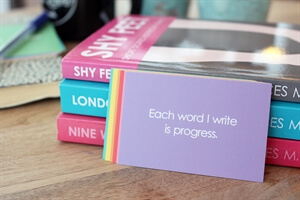NaNoWriMo Inspiration (Day 25): How I learned the importance of "Show, Don't Tell"

Read any book about writing and you'll hear the words "Show, Don't Tell", and allow me to capitalise it, if you will. It's one of the few writing rules I think you can't ignore when writing fiction, along with "Sit in the chair and write" and "If you're not enjoying the book you're writing, the chances are a reader won't enjoy reading it". Okay, I may have paraphrased those rules but I doubt anyone will disagree.
However, I didn't learn about Show, Don't Tell from a book, or even in the last few years since I've been writing
I really learned the importance of Show, Don't Tell when I was in primary school. I can't have been much older than five or six.
It was school assembly. I was sat cross-legged on the gym floor and I watched as the head master walked in front of us carrying two parcels covered in colourful birthday wrapping paper. My eyebrows raised up, I pushed my chin forward and I wondered what was in the big package, the one the size of a shoebox. The other package didn't look so interesting. It was round and small, no bigger than a tennis ball, and it was wrapped badly with lumps of wrapping paper clumped in patches where it overlapped. As he placed them both on top of a table, my eyes focused on to the big package.
"Who would like to open one of these packages?" The headmaster asked us. Hands shot up all around me, including my own.
He picked two children from the front row. They stood up next to him and listened to him as he explained that the two presents were theirs, they just had to decide between them which one they wanted.
Of course, they couldn't. There followed an awkward discussion between the three of them where they agreed that they couldn't agree so the headmaster kindly asked them to sit back down. I don't remember what the two kids looked like, but I can see that big neatly wrapped package vividly. The blue, red and green of the wrapping paper and the way a red ribbon wrapped around the middle and tied in a bow.
"I guess I'll just have to open them by myself," the headmaster said and he did, starting with the box.
He ripped the paper off and it was a shoebox. I wondered what toys were inside. Or maybe there were paints or crayons. All things that I would have loved to play with.
He told us he was about to open the lid of the box. I held my breath and saw the boy next to me lean forward so much her nose touched the hair of the girl in front.
With the lid off he lifted the box up and turned it upside down. Nothing came out. The box was empty.
I was still feeling disappointed by this when he began to unwrap the smaller parcel.
With the paper off he held up a dirty, brown potato... wrapped in a five pound note.
The headmaster looked at the two children who had once been fighting over the box full of nothing but air.
"Now do you wish you had changed your mind?"
From that moment on I never assumed that the biggest things in life were always the most valuable.
You should know now that I do not have a great memory. It's a source of sadness to me that I don't remember more of my childhood in such colourful, precise detail. But I remember this because I was shown the lesson not told it.
Show, Don't Tell in fiction has the same impact. If you lead the reader to come to the conclusions they need to by showing them actions, they will remember the message more than if you simply told them it.
So today as you write your words... show your reader things, actions, reactions. Don't tell them what's the sum of those should be. You're reader is clever - much more so than the five year old me - they will work it out and they will have a better reading experience for it.
And if you think I'm a little oversighted for sharing this so late in the month, it's because I think you'll need to remember it more when you come to edit your book, a stage that is just around the corner...
Happy writing!
Not long to go now! Find more NaNoWriMo Inspiration here

Frances M. Thompson
Find Frankie on Facebook, Twitter, Instagram, Pinterest, and Google+.
 Preptober Tips & 100 Preptober Prompts for NaNoWriMo Prep
Preptober Tips & 100 Preptober Prompts for NaNoWriMo Prep On Writing: The Only NaNoWriMo Tips You'll Ever Need
On Writing: The Only NaNoWriMo Tips You'll Ever Need On Writing: Ten Tips for NaNoWriMo
On Writing: Ten Tips for NaNoWriMo NaNoWriMo Inspiration (Day 30): Someday Soon All This Will Be Someone Else's Dream
NaNoWriMo Inspiration (Day 30): Someday Soon All This Will Be Someone Else's Dream NaNoWriMo Inspiration (Day 29): Ten Songs That Are Actually Novels in Disguise
NaNoWriMo Inspiration (Day 29): Ten Songs That Are Actually Novels in Disguise About the Blog & Frankie
About the Blog & Frankie Welcome to My Amsterdam Travel Blog!
Welcome to My Amsterdam Travel Blog! Welcome to My Luxury Family Travel Blog!
Welcome to My Luxury Family Travel Blog! Welcome to My Writing Blog!
Welcome to My Writing Blog! Lover Mother Other: Poems - Out Now!
Lover Mother Other: Poems - Out Now! I Write Stories That Move You
I Write Stories That Move You Order WriteNOW Cards - Affirmation Cards for Writers
Order WriteNOW Cards - Affirmation Cards for Writers Work With Me
Work With Me